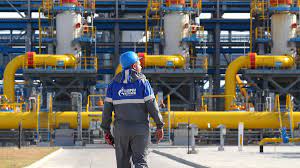Following Russia’s reduction in energy deliveries to many nations, Germany activated the second stage of its three-stage emergency plan for natural gas supplies on Thursday, warning that the region’s largest economy faced a “crisis” and that storage goals for the winter are in jeopardy.
According to the government, the choice was made in response to Russia cutting back on natural gas exports beginning last week and rising energy costs fueled by the conflict in Ukraine. As energy tensions between Russia and the West rise, industrial users are being urged to use less natural gas, and Germany and other nations are returning to coal as an alternative, endangering European climate goals.
We are in a gas crisis, despite the fact that we can’t yet feel it. Robert Habeck, Minister of the Economy and Energy said.
While European Union nations are rushing to restock stocks of the fuel used to generate electricity, power industry, and heat homes in the winter, Russia last week curtailed natural gas to Germany, Italy, Austria, the Czech Republic, and Slovakia. As it reduced flows through the Nord Stream 1 pipeline, Europe’s main natural gas pipeline, traveling under the Baltic Sea to Germany by 60%, Russia’s state-owned energy giant Gazprom laid the blame on a missing item shipped to Canada for repairs.
First-stage warnings concerning supplies and requests for people to conserve have also been issued by other nations, including as Austria and the Netherlands. Two of Europe’s largest consumers of Russian gas, Germany and Italy, have criticized the country’s gas reductions as politically motivated and warned that they could cause the economy to weaken even more.
Habeck declared, “We are in an economic struggle with Russia. Moscow is attempting to undermine European unity and the solidarity it has demonstrated with Ukraine.”
Along with the reductions, gas has recently been cut off to Poland, Bulgaria, Denmark, Finland, France, and the Netherlands.
The German government claimed that current gas needs are being satisfied and that its storage tanks are now 58 percent full, up from this time last year. However, it stated that without additional steps, the target of achieving 90 percent by December won’t be achievable.
Habeck stated that Germany would not retaliate by shutting off its neighbors. Instead, it was advising businesses and locals to cut back on consumption as much as possible.
Habeck warned that “this will disrupt industrial production and become a huge burden for many producers,” adding that “the prices are already high and we need to be prepared for additional increases.”
Even still, the government’s choice was endorsed by the lobbying organization for Germany’s energy sector, BDEW. Calculations indicate that companies have already decreased their demand in recent months by 8%. The government intends to arrange auctions wherein large industrial consumers would be compensated for giving up their contracts in order to promote greater savings.
According to Habeck, the actions being taken, such as giving gas distributors and utility firms substantial loans to deal with price spikes, were required to stop the collapse of the energy markets.
The economy would suffer severely if Germany were to be forced to ration gas for industrial users in order to protect houses, schools, and hospitals.
According to Habeck, individuals may help by making adjustments to their home heating systems now and saving up to 15% during the cold months.
It may sound trivial at times, but he continued, “You have to increase that triviality by 41 million households.”
Germany and other nations have been attempting to obtain additional gas from neighbors like the Netherlands and Norway as well as liquefied natural gas from producers outside of Europe, including the United States, since declaring the first phase of their emergency plan in March as the EU looks to reduce its reliance on Russia by two-thirds by year’s end.
The German government stated on Sunday that it would boost the burning of more polluting coal and decrease the usage of gas for the generation of energy, much to the horror of environmentalists.
According to Carlos Torres Diaz, senior vice president at Rystad Energy, the coal-generating capacity that might be brought back online could meet 9% of the nation’s energy needs while saving a fourth of the gas that the industry currently consumes.
In order to save gas that would otherwise be consumed for electricity, the Netherlands will also permit coal-fired power plants to run at full capacity once more.
Habeck attributed some of the responsibility to prior German political decisions to rely on Russian energy supplies and a lack of developed alternatives.
How different things might have been, he continued, “had we truly achieved significant progress in energy efficiency and the spread of renewables over the last few years rather than just being at a stop.”
His government has launched a set of initiatives to speed up Germany’s adoption of solar and wind energy. However, the government has so far decided against keeping its three remaining nuclear facilities operational past this year.

















